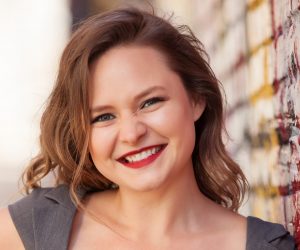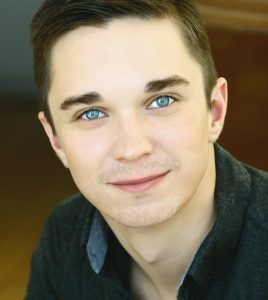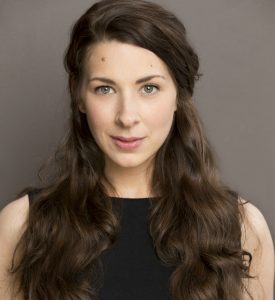If you still think of Oklahoma! as a wholesome slice of Americana and cheerful life on the prairie, you might want to take another look. You don’t have to scratch hard find darker elements beneath the surface of this musical from 1943: misogyny, gun violence, bullying, anti-immigration sentiment. And although Musical Theater Heritage at Crown Center’s “re-imagined” production of Rodgers & Hammerstein’s piece (which runs from June 6th through the 30th) might not exaggerate this underbelly to the extreme extent that Daniel Fish’s current Broadway revival has done, it does not shy away from looking at the piece for what it is: a genuine drama about real human struggles on the frontier.

Taylor Harlow performs as Jud / All photos courtesy of MTH
“It’s all there, I’m not looking to add anything,” said Tim Scott, the MTH’s new executive artistic director, who directs the show. In fact, licensing agreements don’t permit theaters to alter texts without obtaining special permission. And Tim said that’s not really necessary in order to bring home the more jarring aspects of this tale, many of which are traditionally framed as farcical. “That scene with Curly and Jud in the smokehouse is vintage, textbook bullying,” he said of the section in which Curly suggests that, if Jud wants to know whether people care about him or not, he should try suicide. “I’m not adding anything that’s not there. That scene is often played for laughs … but the circumstances of that in 2019 are horrifying. He’s telling Jud to go kill himself.” Tim wants to make sure that “any laughter we get should really be uncomfortable, uneasy laughter.”
What MTH audiences will find is a pared-down production in which most of the characters remain on the theater’s diminutive stage for much of the play, along with an instrumental ensemble that forms part of the action: upright piano, fiddle, guitar, banjo, double bass, drum set, and a cello for an occasional touch of lyricism. “I want it to be very visceral, very immediate and relatable,” Tim said. “So I’d like all of the musicians to be onstage, to be in the world of the play … so that it’s more like ‘porch music.’ ”
Purists who love cowboys clad in primary colors and Thomas Hart Benton-style backdrops should look elsewhere, according to Tim, and the same goes for the music. “We want to scrub away that ’40s Broadway sound. It was all about big brass sections and 40-piece orchestras and lush-sounding scores that don’t sound anything like what the Midwest sounded like at the turn of the 20th century, or even today.”

Danielle Barger is Laurey
These elements have tended to distance the audience from the story, he added: “made it less relatable, made it seem like a distant story.” He wants to create an Oklahoma that is a “communal experience, with some people up onstage playing music.”
Tim admits he is no fan of big, hyperbolic show numbers, and he has already brought this viewpoint to MTH productions. “I don’t like anything about theater that makes it seem distant, that makes it seem antiquated, or makes it seem caricature-ish,” he said. “So with Cats we scrubbed away all those cat costumes, because I feel that they distance the audience from the story, and we scrubbed away all that ’80s sound, with the synthesizers, which I thought made it feel too much like an ’80s period piece.”
Founded in 1997 by George Harter, whose astounding knowledge of musical theater was already known through his nationally syndicated radio program A Night on the Town, Musical Theater Heritage began producing live “revue-style” shows in 2003, gradually evolving into a venue for full-scale productions after its move to a 244-seat theater at Crown Center in 2007.
Tim’s more abstract, “Brechtian” view of theater, however, has caused him to shy away from razzmatazz approaches in general, and he eschews productions of Oklahoma that looked like a “Western version of Guys and Dolls, with big overblown costumes and overblown dialect. It’s cheesy and caricature-y … and it’s why I think musicals, up until five or 10 years ago, had such a bad rap from theater connoisseurs. … And it’s exactly the opposite of how I think of plays. I think of musicals as musical plays.”
But again he stressed that his goal, in any work, is to stay true to the text. “I want to honor the words that are down there. There’s a lot of rich material there.”

Andrew Keller is Curly
If you examine Oklahoma closely enough, in fact, you’ll find there’s a great deal of dark, unscrupulous behavior that is passed off as parody. Jud Fry is a loner who happens to love the same woman as Curly, and his violent fate results from our “hero” telling him what a miserable loser he is. (In “Lonely Room,” the socially awkward Jud curses “that smart-aleck cowhand who thinks he is better’n me!” and says all he wants is a woman who “ain’t afraid of my arms, and her own soft arms keep me warm!”)
To make it worse, Tim said, during the makeshift “trial” for Curly, everyone blithely decides that “Carnes will be the judge and, ‘Oh, we don’t have to have a trial: It’s all good.’ I don’t feel good about that. There’s a man dead!”
For a fresh take on the dance, MTH has hired Kenny Personett, whose specialty is hip-hop, as choreographer, and the company has also challenged scenic designer Mark Exline to re-create a sort of country hoedown set à la the early TV “barn dance” shows. Thus it will seem perfectly natural for Curly to step up to a mike and randomly break into “Oh, What a Beautiful Morning!”
The company has even encouraged costume designer Georgianna Londre Buchanan to buy clothes off local racks. “I like to heighten the theatricality,” Tim said. “We want to do everything we can to make it seem like these characters are just like you and me.”
It’s important to keep in mind, of course, that this musical was created during wartime (though based on a play from 1931), and one could say that it presents American values through sort of “why we fight” lens. When Oklahoma opened, it attempted to “hold up a mirror to the ideal image of America,” Tim said, “cowboys and heroes and villains and apple pie.”

Elizabeth Reese is Aunt Eller
In the 1940s Oklahoma was bigger than Hamilton: People lined up around the block for tickets. Its initial production ran for 2,212 performances. “In 1943, it served to instill the American dream, the American way, and the perseverance of that dream during World War II,” Tim said. “That’s part of the reason it was so embraced.” But the musical “holds up a mirror” in a way that permits choices: “You can either play up the classic, hero-villain-ingenue romance,” Tim said, “or you can look at the subtext, which is so, so rich. And it’s not even that deep a subtext: It’s right there. … It’s brilliant. … It’s amazing that this play was written 76 years ago. Because it may be more topical today than it was in 1943.”
Oklahoma! stars Danielle Barger (Laurey), Andrew Keeler (Curly), Taylor Harlow (Jud), Lexi Brie (Ado Annie), Elizabeth Reese (Aunt Eller), Austin Ragusin (Will Parker), and William Pendergast (Ali Hakim). It features musical direction by Michalis Koutsoupides of Avila University and lighting by distinguished lighting and projection designer Jamie Leonard.
For tickets to call 816-221-6987 or go to www.musicaltheaterheritage.com. To reach Paul Horsley, performing arts editor; send an email to paul@kcindependent.com or find him on Facebook or Twitter.